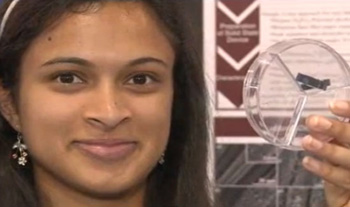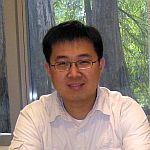Campus News
High school student’s work in UCSC lab earns Intel Science Fair prize
Eesha Khare, a student at Lynbrook High School in San Jose, won a $50,000 science fair prize for work carried out in Yat Li’s chemistry lab.


A Saratoga high school student’s persistence, motivation, and willingness to spend a lot of time in the lab paid off in a big way when she won a $50,000 award at the 2013 Intel International Science and Engineering Fair. Eesha Khare, a student at Lynbrook High School in San Jose, won the prize for her work on an energy storage device carried out under the mentorship of Yat Li, an assistant professor of chemistry at UC Santa Cruz.
“Her project was to develop nanostructured electrodes for supercapacitors, a type of energy storage device,” Li said. “Eesha’s research was an extension of work we are doing in my lab, but she came up with her own ideas and took it in a new direction. It was a well-planned and well-managed project, so I was very impressed.”
Li has been mentoring high school students in his lab since 2010 through the UCSC Science Internship Program launched by astronomy professor Puragra Guhathakurta. In 2011, an intern in Li’s lab was one of two high school students mentored at UCSC who were finalists in the nationwide Intel Science Talent Search competition.
Li said he has been impressed by all of the high school students who have worked in his lab. “They are very motivated and eager to learn,” he said. “Each year we see more students applying to the program, and they are coming from a more diversified group of high schools.”
In 2012, Li knew he would be traveling a lot during the summer, so he decided not to participate in the internship program. But Khare had approached him early in the year and really wanted to work in his lab, so Li agreed to take her on informally and assigned one of his graduate students, Xihong Lu, to oversee her work.
“I gave her several papers on two different areas of research in my lab and asked her to come up with an idea for a project,” Li said.
Khare was interested in Li’s research on novel nanomaterials for energy conversion and energy storage. She designed experiments based on the literature she read, and brainstormed ideas with Li and Lu. During her ten-week internship, she fabricated and tested a supercapacitor device, demonstrating that it can power LEDs and a timer.
A supercapacitor holds much more energy than an ordinary capacitor, but less than a battery (the “energy density” of a battery is about 10 times that of a supercapacitor). The advantages of supercapacitors include the ability to charge and discharge extremely rapidly, and they don’t degrade over time or over hundreds of thousands of cycles of charging and discharging. Rechargable batteries, in contrast, have a limited number of cycles and can’t deliver a large amount of power quickly.
Khare said she was motivated to work on the supercapacitor because she was frustrated by how often her cell phone’s battery dies and how long it takes to recharge it. Her supercapacitor is small and flexible, and it can charge up in about 20 to 30 seconds. Unfortunately, this led to a lot of news stories suggesting that her project would enable people to charge their cell phones in 20 seconds.
“I think it started from a misunderstanding,” Li said. “Charging can be done very quickly with a supercapacitor, but it doesn’t store nearly as much energy as a lithium ion battery, so it would not be practical for powering a cell phone.”
Supercapacitors do have a wide range of applications, however, especially in situations where the ability to store or deliver a lot of energy quickly is more important than the energy storage capacity. In Shanghai, China, some city buses are powered by supercapacitors, charging up at each bus stop. Supercapacitors are often combined with rechargable batteries to provide, for example, backup or emergency power, and there may well be potential applications for supercapacitors in future cell phones. But don’t expect to be charging your cell phone in 20 seconds any time soon, Li said.